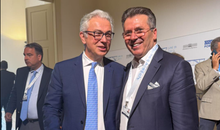
 Flash News
Flash News
BIRN: Scientific research in crisis pushes young researchers out of Albania

Scarce funds, lack of transparency and bureaucracy within universities are discouraging young researchers who are looking beyond the country's borders to fulfill their academic ambitions.
When Klodian Dhoska finished his studies in 2007, he looked outside Albania to continue his doctorate. Today a lecturer at the Polytechnic University of Tirana, Dhoska says that the shortcomings in scientific research pushed him to leave the country to fulfill his academic ambitions.
Seventeen years later, little has changed.
"Where is the world out there with research, where are we?" It's like night and day," Dhoska told BIRN.
"There is a big deadlock here, as only 5% of the academic staff is engaged in real scientific research, while 95% do not even prioritize it," he added.
For the first time this year, the Albanian government announced the doubling of funding for scientific research from 758 million ALL in 2023 to 1.5 billion ALL for 2024. However, funding for science continues to remain nearly 10 times lower than the average of European Union countries.
About 500 million ALL or 1/3 of the 2024 budget for scientific research comes from foreign funding, which also carries the obligation to participate in various international projects. This significantly reduces the budget available to scientific researchers in the country.
The trickle-down distribution of funds by the government is not the only problem. According to a monitoring carried out by the organization "Civic Attitude", even public universities in Albania give more priority to the decoration of offices and the purchase of furniture than the funds that go in favor of science.
Migen Qiraxhi, coordinator from "Civic Attitude" told BIRN that international indices clearly show that scientific research has remained in a vicious circle in Albania for years. He also added that it is very rare for academics to engage in criticism of public policies.
"Academics, that is, the most educated of the country, have Academic Freedom and criticism as in 1992, the same as 32 years ago, when Albania had just emerged from a closed system," said Qiraxhi.
Faced with this situation, young seekers feel discouraged and continue to look for universities abroad to fulfill their goals.
Jetmira Ymeralilaj is a physics teacher in Berat who is passionate about experimental physics. She says that after completing her Master's studies, she tried to engage in scientific research, but could not find the right door.
With insufficient funds and no transparency, Ymeralilaj says that in Albania there are very few opportunities for those who want to explore genuine scientific research.
"For experimental physics there is none, I've searched, but I haven't been able to find anything, unless I didn't know how to orient myself," she explains.
"If you are going to do scientific research yourself, you should start with simple surveys. You don't have the right tools and you don't have the right support," she added.
Against her will, Jetmira is looking at emigration as an opportunity to continue scientific research.
"When I'm disappointed, who loves physics above all else... I'm looking to move, but what keeps me in two minds is that I have to start all over again," she continued.
Even Gledia Shehi, an excellent student at the Faculty of Law at the University of Tirana, had no plans to leave Albania. But after a 5-month experience with the Erasmus program in Germany, she is in two minds.
"I saw that I had many more opportunities there, which I don't have at my university. I had access to a lot of information, you could search for anything you wanted, while our library is not that rich, it is quite limited,” says Shehi.
"Even if I were to develop my doctorate in Albania, I would not rely only on what is offered here, I would definitely do a part abroad," she added.
Teacher Klodian Dhoska lists dozens of reasons that, according to him, make the path of scientific research difficult in Albania, but he insists that the "Achilles' heel" lies in the centralization of this process. He explains that in order to present an idea and make an application, several recommendations are needed from the administrator to the rector of the university.
"All these links are a problem for companies. If one of them doesn't like it, it takes away my chance to apply. So let's face it, if the head of the department doesn't like me as a person, I stay where I am, I can't apply," says Dhoska.
Decentralization, according to him, means reducing bureaucracies and suggests following the models of countries that have developed scientific research, according to which, it is the lecturer together with his work group that applies and manages the project and not the university.
"Most are individualists, hide information or materials, block you. For me, the key to success is the decentralization of scientific research," he concluded./BIRN
Latest news


Not only the body, swimming also helps the brain
2025-07-05 21:02:49
"Be careful with the water", Alimehmeti warns about the health risks of summer
2025-07-05 20:39:10
PSG beats Bayern Munich 2-0, advances to Club World Cup semifinals
2025-07-05 20:19:38

Two vehicles collide on the Elbasan-Peqin axis, drivers injured
2025-07-05 19:26:29

What does Zelenskyy have more than Zegjineja?
2025-07-05 18:45:26

Fiscal peace, but at a cost
2025-07-05 18:00:10
'Bankers' tax evasion, Chinese CEO and former director jailed
2025-07-05 17:39:21
Kyle Walker joins English club on two-year deal
2025-07-05 17:20:24
Two cars collide on the Saranda-Delvina axis, 4 injured
2025-07-05 17:05:29
Touching gesture! Liverpool will pay Jota's family's salary until 2027
2025-07-05 16:45:18
The zodiac signs that cheat most often
2025-07-05 16:25:53

"I asked for the dismissals", Dredha tries to soften Rama's 'blow' in Vlora
2025-07-05 15:48:49
Bomb threat in Parliament, prosecutor: It was a lie
2025-07-05 15:22:28

Bardhi: The recount revealed how greedy Zeqine Balluku is in stealing
2025-07-05 14:44:29
Knife wound on the secondary road Tirana-Durrës, perpetrator sought
2025-07-05 14:37:54
Tears and pain, Diogo Jota is escorted to his final home
2025-07-05 14:21:34
Success starts with yourself! Simple ways to invest in personal development
2025-07-05 13:58:50
Unlicensed firearms found in apartment, 50-year-old arrested in Lushnje
2025-07-05 13:43:11

Tirana Court remands Skerdi Sina to prison
2025-07-05 12:59:34
Cocaine laboratory in Greece, here are the Albanians arrested and wanted
2025-07-05 12:40:16
Directed Justice/Vangjeli: SPAK does not investigate any scandal involving Rama
2025-07-05 12:22:03

Bomb alert, Police remove MPs and media from Kosovo Parliament building
2025-07-05 11:48:16
"The will of the people" and the irony of ordered resignations
2025-07-05 11:32:05
Summer drowning risk: How to enjoy the water without risking your life
2025-07-05 11:20:27
Fire situation in the country, 16 fires reported in 24 hours, 4 still active
2025-07-05 11:07:04
Car hits pedestrian at white lines, injured in serious condition in Vlora
2025-07-05 10:59:58
Mosquito-borne diseases are a growing problem in Europe
2025-07-05 10:44:13



One of Sweden's most dangerous and wanted criminals arrested in Turkey
2025-07-05 09:38:29
Foreign exchange/ How much foreign currencies are bought and sold today
2025-07-05 09:18:38

"Don't be influenced by the opinions of others", today's horoscope
2025-07-05 08:40:50

Morning Post/ In 2 lines: What mattered yesterday in Albania
2025-07-05 08:02:07

Trump says he's ready to raise tariffs to 70% on some countries
2025-07-04 22:35:52
Tre shenjat e zodiakut që do ‘pasurohen’ në Korrik
2025-07-04 22:05:09
Gaza War: Hamas Accepts US Proposal for 60-Day Ceasefire
2025-07-04 21:50:10
Autocracy in Albania, Fuga: Governance has gotten out of control
2025-07-04 21:40:51
Meta: Agriculture on credit, the new fraud!
2025-07-04 21:26:39




Vote recount in Durrës ends without changes
2025-07-04 20:12:54
Gas station explodes in Rome, 25 injured (VIDEO)
2025-07-04 20:00:20

These afternoon habits often sabotage weight loss
2025-07-04 19:39:28
Former Arsenal player Thomas Partey accused of rape
2025-07-04 19:24:21
Shepherd disappears without a trace in Delvina
2025-07-04 19:14:31

Bardho gave Zegjine's mandate/Braho: Unfair! It violates the electoral system
2025-07-04 19:01:08


Rapid developments in the Sultanates!
2025-07-04 18:00:06



Italy tightens rules for skateboard traffic
2025-07-04 17:20:18

Unusual for the time, dense fog covers the coast of Vlora
2025-07-04 16:48:01


Accident on the Shkodra-Lezhë axis, one dead and 3 injured
2025-07-04 16:14:19
Albania with fewer requests for asylum and Albanian citizenship in 2024
2025-07-04 16:06:57

Albania last for quality of life, DP: Technical government is the solution!
2025-07-04 15:42:30
Nico Williams says "No" to Barcelona, signs with Athletic Club until 2035
2025-07-04 15:33:35
Fires in the country, four fires are still active, what is the situation?
2025-07-04 15:24:20

Summer brings big changes for these 4 zodiac signs
2025-07-04 15:00:04
Osmani: MPs need to agree to a secret ballot for the Speaker of Parliament
2025-07-04 14:51:09
Serious accident on the Peqin-Elbasan axis, two injured
2025-07-04 14:37:56

GJKKO leaves in force the security measure for the head of the KPP
2025-07-04 13:58:17
Who will replace Ilir Meta and take over the leadership of the PL?
2025-07-04 13:50:36
Berisha: Dismissal of directors in Vlora, another act of 'scapegoats'
2025-07-04 13:41:46




Librazhd/ In a serious psychological state, the young man consumes pesticides
2025-07-04 13:05:07


Weapons trafficked from Kosovo to Albania, two arrested, 8 pistols seized
2025-07-04 12:33:28
Konsumimi i tepërt i çokollatës, ja cilat janë dëmet që shkakton në organizëm
2025-07-04 12:23:35

Fires in the country, 21 fires in the last 24 hours, 4 still active
2025-07-04 12:00:19
WB calls for debt transparency: Albania to publish details of every loan
2025-07-04 11:50:05
